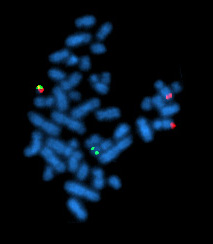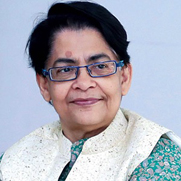Related Research Articles

Barbara McClintock was an American scientist and cytogeneticist who was awarded the 1983 Nobel Prize in Physiology or Medicine. McClintock received her PhD in botany from Cornell University in 1927. There she started her career as the leader of the development of maize cytogenetics, the focus of her research for the rest of her life. From the late 1920s, McClintock studied chromosomes and how they change during reproduction in maize. She developed the technique for visualizing maize chromosomes and used microscopic analysis to demonstrate many fundamental genetic ideas. One of those ideas was the notion of genetic recombination by crossing-over during meiosis—a mechanism by which chromosomes exchange information. She produced the first genetic map for maize, linking regions of the chromosome to physical traits. She demonstrated the role of the telomere and centromere, regions of the chromosome that are important in the conservation of genetic information. She was recognized as among the best in the field, awarded prestigious fellowships, and elected a member of the National Academy of Sciences in 1944.

Cytogenetics is essentially a branch of genetics, but is also a part of cell biology/cytology, that is concerned with how the chromosomes relate to cell behaviour, particularly to their behaviour during mitosis and meiosis. Techniques used include karyotyping, analysis of G-banded chromosomes, other cytogenetic banding techniques, as well as molecular cytogenetics such as fluorescence in situ hybridization (FISH) and comparative genomic hybridization (CGH).
The Jawaharlal Nehru Centre for Advanced Scientific Research (JNCASR) is a multidisciplinary research institute located at Jakkur, Bangalore, India. It was established by the Department of Science and Technology of the Government of India, to mark the birth centenary of Pandit Jawaharlal Nehru, the first prime minister of independent India. It is considered one of the most prestigious research institutes in India. In 2019, JNCASR was ranked #7 among the world's top ten research institutes by Nature journal in a normalised ranking of small research institutes with high quality output.

Edavalath Kakkat Janaki Ammal was an Indian botanist who worked on plant breeding, cytogenetics and phytogeography. Her most notable work involved studies on sugarcane and the eggplant (brinjal). She also worked on the cytogenetics of a range of plants and co-authored the Chromosome Atlas of Cultivated Plants (1945) with C.D. Darlington. She took an interest in ethnobotany and plants of medicinal and economic value from the rain forests of Kerala, India. She was awarded Padma Shri by the then prime minister of India in 1977.
Pushkar Sharma is a medical scientist working in the National Institute of Immunology, New Delhi, India. He was awarded the Shanti Swarup Bhatnagar Prize for science and technology, the highest science award in India, for the year 2013 in medical science category. Sharma's research interests are in the areas of genetics, cell signalling and cancer biology, with special focus on problems connected with dissection of eukaryotic cell signaling pathways.
Manju Ray was an Indian scientist specializing in Molecular Enzymology and Cancer Biochemistry. Her research has contributed significantly to the development of anticancer drugs and understanding the differentiation process of cells. Her interests include tumor biochemistry and molecular enzymology. She was awarded the Shanti Swarup Bhatnagar Prize for Science and Technology in the year 1989, being only the second woman to receive this award in the category 'Biological Sciences'.
Paramjit Khurana is an Indian scientist in Plant Biotechnology, Molecular Biology, Genomics who is presently Professor in the Department of Plant Molecular Biology in the University of Delhi, Delhi. She has received many awards and published more than 125 scientific papers.
Hari Krishan Jain was an Indian cytogeneticist and plant breeder, known for his contributions to the field of genetic recombination and the control of interchromosome level. He is a former chancellor of the Central Agricultural University, Imphal, a former director of the Indian Agriculture Research Institute and a recipient of honours such as Rafi Ahmed Kidwai Award, Borlaug Award and Om Prakash Bhasin Award. The Council of Scientific and Industrial Research, the apex agency of the Government of India for scientific research, awarded him the Shanti Swarup Bhatnagar Prize for Science and Technology, one of the highest Indian science awards, in 1966, for his contributions to biological sciences. He received the fourth highest Indian civilian honor, the Padma Shri, in 1981.

Arun Kumar Sharma, popularly known as AKS, was an Indian cytogeneticist, cell biologist, cytochemist and a former Sir Rashbehary Ghose Professor and Head of the Department of Botany at the University of Kolkata, College of Science and Technology. Considered by many as the father of Indian cytology, he headed the Centre for Advanced Study on Cell and Chromosome at the university and is known for his contributions to the studies on the physical and chemical nature of chromosomes. A Jawaharlal Nehru fellow, he is a recipient of several honors including the Om Prakash Bhasin Award and the VASVIK Industrial Research Award. The Council of Scientific and Industrial Research, the apex agency of the Government of India for scientific research, awarded him the Shanti Swarup Bhatnagar Prize for Science and Technology, one of the highest Indian science awards, in 1967, for his contributions to biological sciences. The Government of India awarded him the third highest civilian honor of the Padma Bhushan in 1983.
Birendra Bijoy Biswas is an Indian molecular biologist, geneticist and a former director of Bose Institute, Calcutta. He is known for his contributions to the metabolism of nucleic acid and the regulation of protein synthesis in plant cells. He is an elected fellow of the Indian Academy of Sciences and the Indian National Science Academy. The Council of Scientific and Industrial Research, the apex agency of the Government of India for scientific research, awarded him the Shanti Swarup Bhatnagar Prize for Science and Technology, one of the highest Indian science awards, in 1972, for his contributions to biological sciences.
Satish Chandra Maheshwari (1933-2019) was an Indian botanist and a former professor at the University of Delhi. He is known for his contributions to the fields of plant physiology and plant molecular biology. Maheshwari is an elected fellow of the Indian Academy of Sciences, the Indian National Science Academy and the National Academy of Sciences, India. The Council of Scientific and Industrial Research, the apex agency of the Government of India for scientific research, awarded him the Shanti Swarup Bhatnagar Prize for Science and Technology, one of the highest Indian science awards, in 1972, for his contributions to biological sciences. He died from lung cancer on June 12, 2019.
Sushil Kumar was an Indian geneticist and academic, known for his Plant and microbial genetical genomics, especially the studies on Escherichia coli and Lambda phage as well as on the mutants of Rhizobium. He was a former director of the Central Institute of Medicinal and Aromatic Plants of the Council of Scientific and Industrial Research and an elected fellow of the Indian National Science Academy, National Academy of Agricultural Sciences, National Academy of Sciences, India, and Indian Academy of Sciences. The Council of Scientific and Industrial Research, the apex agency of the Government of India for scientific research, awarded him the Shanti Swarup Bhatnagar Prize for Science and Technology, one of the highest Indian science awards, in 1981, for his contributions to biological sciences.
Bhabatarak Bhattacharyya, popularly known as Bablu Bhattacharyya, is an Indian structural biologist, biochemist and academic, known for his studies on the colchicine-tubulin interaction. He is a former professor and the head of the department of biochemistry at the Bose Institute, Kolkata and an elected fellow of the Indian Academy of Sciences, Indian National Science Academy, National Academy of Sciences, India and The World Academy of Sciences. The Council of Scientific and Industrial Research, the apex agency of the Government of India for scientific research, awarded him the Shanti Swarup Bhatnagar Prize for Science and Technology, one of the highest Indian science awards, in 1988, for his contributions to biological sciences.

2018 INSA Aryabhata Medal
2022 Asiatic Society, Kolkata Joy Gobind Law Memorial Medal

Amitabh Joshi is an Indian evolutionary biologist, population ecologist, geneticist and a professor at Jawaharlal Nehru Centre for Advanced Scientific Research (JNCASR). He heads the Evolutionary Biology Laboratory at JNCASR and is known for his studies on Evolutionary genetics and Population ecology. An elected fellow of the Indian Academy of Sciences, National Academy of Sciences, India, and Indian National Science Academy, he was also a J. C. Bose National Fellow (2011-2021) of the Department of Science and Technology. He served as the Chief Editor of the Journal of Genetics (2008-2014) and Editor of Publications of the Indian Academy of Sciences (2017-2021). The Council of Scientific and Industrial Research, the apex agency of the Government of India for scientific research, awarded him the Shanti Swarup Bhatnagar Prize for Science and Technology, one of the highest Indian science awards, in 2009, for his contributions to biological sciences.
Suvendra Nath Bhattacharyya is an Indian molecular biologist, epigeneticist and the principal scientist at the Indian Institute of Chemical Biology of the Council of Scientific and Industrial Research. He is a recipient of the Swarnajayanthi Fellowship of the Department of Science and Technology and the National Bioscience Award of the Department of Biotechnology. The Council of Scientific and Industrial Research, the apex agency of the Government of India for scientific research, awarded him the Shanti Swarup Bhatnagar Prize for Science and Technology, one of the highest Indian science awards, in 2016, for his contributions to biological sciences.

Chandrima Shaha is an Indian biologist. As of September 2021, she is the J. C. Bose Chair Distinguished Professor at the Indian Institute of Chemical Biology, Kolkata. She is the former Director and former Professor of Eminence at the National Institute of Immunology. She was the President of Indian National Science Academy (2020–22) and the Vice President of the same academy (2016–2018). She is an elected fellow of the World Academy of Sciences, Indian National Science Academy, Indian Academy of Sciences, National Academy of Sciences and the West Bengal Academy of Science and Technology.
Subhadeep Chatterjee is an Indian molecular biologist and a scientist at the Centre for DNA Fingerprinting and Diagnostics (CDFD). A member of Guha Research Conference, he is known for his studies on plant-microbe interactions and heads the Lab of Plant-Microbe Interactions at CDFD where he hosts several researchers.

The University College of Science, Technology and Agriculture are two of five main campuses of the University of Calcutta (CU). The college served as the cradle of Indian Sciences by winning the Nobel Prize in Physics in 1930 and many fellowships of the Royal Society London.
References
- ↑ "Archana Sharma(1932-2008)" (PDF).
- ↑ The Shaping of Indian Science: 1982-2003 (PDF). p. 1669.
- 1 2 3 4 5 6 "Archana Sharma" (PDF).
- 1 2 "Archana Sharma: An Indian Woman Botanist, a Cytogeneticist, Cell Biologist and a Cytotoxicologist". Archived from the original on 16 February 2019. Retrieved 16 February 2019.
- ↑ Shah, Aditi (29 July 2018). "Dr. Archana Sharma: The Pioneering Indian Botanist | #IndianWomenInHistory". Feminism In India. Retrieved 16 February 2019.
- ↑ "INSA :: Deceased Fellow Detail". insaindia.res.in. Archived from the original on 16 February 2019. Retrieved 16 February 2019.
- ↑ Nicholas Polunin (5 November 2013). World Who Is Who and Does What in Environment and Conservation. Routledge. pp. 294–. ISBN 978-1-134-05938-6.
- ↑ N. K. Soni (1 April 2010). Fundamentals Of Botany. Tata McGraw-Hill Education. pp. 375–. ISBN 978-1-259-08349-5.
- ↑ "List of 14 Eminent Geneticists (With their Contributions)". Biology Discussion. 2016. Retrieved 13 September 2016.
- ↑ "Padma Awards" (PDF). Ministry of Home Affairs, Government of India. 2015. Archived from the original (PDF) on 15 October 2015. Retrieved 21 July 2015.
- ↑ "Fellowship | Indian Academy of Sciences". www.ias.ac.in. Retrieved 16 February 2019.
- ↑ "View Bhatnagar Awardees". Shanti Swarup Bhatnagar Prize. 2016. Retrieved 4 September 2016.